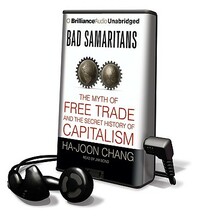Take a photo of a barcode or cover
69 reviews for:
Bad Samaritans: The Myth of Free Trade and the Secret History of Capitalism
Ha-Joon Chang
69 reviews for:
Bad Samaritans: The Myth of Free Trade and the Secret History of Capitalism
Ha-Joon Chang
dark
informative
challenging
informative
I wanted to start reading Why Nations Fails, i checked Goodreads reviews on it, and came across this book as a 'critic' of Nations, so i had to give it a try first.
This book highly criticize the Liberal economy and it's preachers. His main point is that, while Developed Countries through their machinery (IMF, WB & WTO), propagate and forces poor countries to liberalise their economy—free markets, low tarrifs, devalued currency, democracy etc— so as to develop their economy, those were not the paths followed by them to where they are now. By facts, he has shown how Developed Countries of today (US, Britain, France, Japan, Sweden etc) were Protectionists in their manufacturing, had high tarrifs on imports which could affects home industries, they were less protective in Intellectual Property so as to encourage borrowing and thieving of ideas and counterfeiting products. The book shows that after countries were fully developed and their businesses needed protection no more, they then started to champion free trade. This is done in poor countries so as to access Markets and raw materials. There for Neo-liberalists do champions the policies which knows they won't wake and wasn't actually what helped them to be where they are today. i.e THE ARE KICKING AWAY THE LADDER.
This book highly criticize the Liberal economy and it's preachers. His main point is that, while Developed Countries through their machinery (IMF, WB & WTO), propagate and forces poor countries to liberalise their economy—free markets, low tarrifs, devalued currency, democracy etc— so as to develop their economy, those were not the paths followed by them to where they are now. By facts, he has shown how Developed Countries of today (US, Britain, France, Japan, Sweden etc) were Protectionists in their manufacturing, had high tarrifs on imports which could affects home industries, they were less protective in Intellectual Property so as to encourage borrowing and thieving of ideas and counterfeiting products. The book shows that after countries were fully developed and their businesses needed protection no more, they then started to champion free trade. This is done in poor countries so as to access Markets and raw materials. There for Neo-liberalists do champions the policies which knows they won't wake and wasn't actually what helped them to be where they are today. i.e THE ARE KICKING AWAY THE LADDER.
challenging
hopeful
reflective
Compared to other Ha-Joon Chang’s books I read before (23 Things They Don’t Tell You About Capitalism and Economics the User Guide) this one is the least I enjoyed. It took me almost a year to finish it because I read other books in between.
.
Similar to 23 Things and Economics, Bad Samaritans criticizes rich countries and the international organizations policies toward developing countries that tend to harm global prosperity. However, Chang’s alternative policies are similar. .
For example, Chang criticize TRIPS of the WTO since intellectual property rights will only cause limitations for people to innovate, especially those in developing countries. However, Chang said that IPR is still needed, only the period of protection should be shortened. IMHO, it will not solve a problem. .
.
The 2nd problem I found within this book is that Chang tolerates a (small) corruption and dictatorship. He takes Indonesia under Soeharto as a “successful” example. What Chang did not taken into account (and many other economists) there are severe social problems that still continues 20 years after Soeharto stepped down. In numbers, Indonesia might be successful in terms of its economy, but there are huge social gap between the western and the eastern part of Indonesia.
.
However, I agree with parts where Chang explains that there are no connection between culture and development. I agree that there is a need of combinatuon of ideological exhortation, policy measure to promote economic development and the institutional changes that foster the desired cultural changes. However, changing habits and/or culture takes a lot of time, and between that there will changes in politics, etc, that too will affect economic development.
.
I also have a sense that Chang is actually a Keynesian, he praises Keynes a couple of time, despite the fact that there are numerous critics toward Keynes’s “recipe” to handle economic issues.
.
As I mentioned in my previous post, Chang glorifies protectionism, and that it is the best policy for a country to develop.
.
Similar to 23 Things and Economics, Bad Samaritans criticizes rich countries and the international organizations policies toward developing countries that tend to harm global prosperity. However, Chang’s alternative policies are similar. .
For example, Chang criticize TRIPS of the WTO since intellectual property rights will only cause limitations for people to innovate, especially those in developing countries. However, Chang said that IPR is still needed, only the period of protection should be shortened. IMHO, it will not solve a problem. .
.
The 2nd problem I found within this book is that Chang tolerates a (small) corruption and dictatorship. He takes Indonesia under Soeharto as a “successful” example. What Chang did not taken into account (and many other economists) there are severe social problems that still continues 20 years after Soeharto stepped down. In numbers, Indonesia might be successful in terms of its economy, but there are huge social gap between the western and the eastern part of Indonesia.
.
However, I agree with parts where Chang explains that there are no connection between culture and development. I agree that there is a need of combinatuon of ideological exhortation, policy measure to promote economic development and the institutional changes that foster the desired cultural changes. However, changing habits and/or culture takes a lot of time, and between that there will changes in politics, etc, that too will affect economic development.
.
I also have a sense that Chang is actually a Keynesian, he praises Keynes a couple of time, despite the fact that there are numerous critics toward Keynes’s “recipe” to handle economic issues.
.
As I mentioned in my previous post, Chang glorifies protectionism, and that it is the best policy for a country to develop.
challenging
hopeful
informative
reflective
slow-paced
I like Ha-Joon Chang as an author but I must say I like this one less than Economics: A User's Guide. However, I read that one a while ago so maybe I just forgot how hard it is to overcome my natural dislike of economics to make me like a book about it.
I liked learning things from this book and I enjoyed how much it tied in with another book I read recently, Debt: The First 5000 Years by David Graeber, but I disliked that Chang didn't quite connect the last dot that the root of the issue is capitalism.
Will still be reading his third book though, the stuff I learn from his writing is valuable enough to make forcing myself to read economics worth it.
I liked learning things from this book and I enjoyed how much it tied in with another book I read recently, Debt: The First 5000 Years by David Graeber, but I disliked that Chang didn't quite connect the last dot that the root of the issue is capitalism.
Will still be reading his third book though, the stuff I learn from his writing is valuable enough to make forcing myself to read economics worth it.
It's good to get a different view other than neo liberalism. At points the analogies are tiring and the amount of acronyms took me back to college having to write a glossary to keep checking...
I'm not the most avid consumer of non-fiction, so it wasn't the fastest read to get through for me. But, it was incredibly interesting (and a good refresher on basic economics, too). The subject material definitely requires a good amount of concentration, but the author does make it as approachable as I think you could get when talking about neoliberalism, using metaphors and a plethora of examples. A must read for any interested in learning about neoliberalism (whether pro- or against-).
A very interesting book. I read it to discover how misguided the author is, and he convinced me. Free trade (as in Adam Smith's Wealth of Nations) is still the best economic model, but only between equal partners. Developing countries needs protection so that they can develop to the point where they can compete, just like kids are protected at home while getting an education...
informative
medium-paced
Really interesting insight into protectionism and economic policy in "global south" states.




